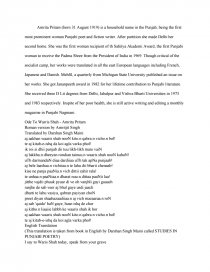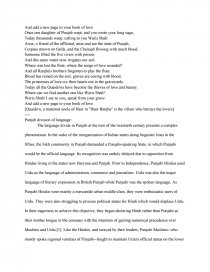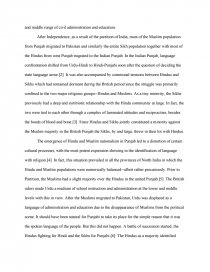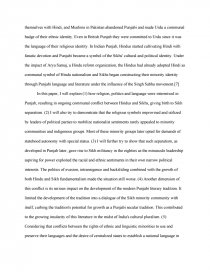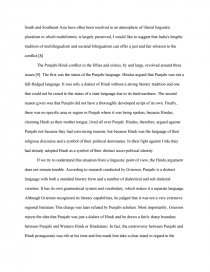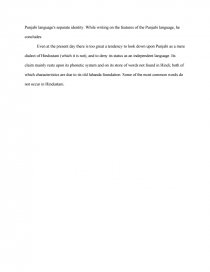Amrita Pritam
Essay by review • December 8, 2010 • Research Paper • 1,748 Words (7 Pages) • 1,568 Views
Amrita Pritam (born 31 August 1919) is a household name in the Punjab, being the first most prominent woman Punjabi poet and fiction writer. After partition she made Delhi her second home. She was the first woman recipient of th Sahitya Akademi Award, the first Punjabi woman to receive the Padma Shree from the President of India in 1969. Though critical of the socialist camp, her works were translated in all the east European languages including French, Japanese and Danish. Mehfil, a quarterly from Michigan State University published an issue on her works. She got Jananpeeth award in 1982 for her lifetime contribution to Punjabi literature. She received three D Lit degrees from Delhi, Jabalpur and Vishva Bharti Universities in 1973 and 1983 respectively. Inspite of her poor health, she is still active writing and editing a monthly magazine in Punjabi Nagmani.
Ode To Warris Shah - Amrita Pritam
Roman version by Amritjit Singh
Translated by Darshan Singh Maini
aj aakhan waaris shah nooN kito.n qabra.n vicho.n bol!
te aj kitab-e-ishq da koi agla varka phol!
ik roi si dhii punjab dii tuu likh-likh mare vaiN
aj lakkha.n dheeyan rondian tainuu.n waaris shah nooN kahaN!
uTh darmandaN diaa dardiiaa uTh tak apNa punjaab!
aj bele laashaa.n vichiiaa.n te lahu dii bharii chenaab!
kise ne panja paaNia.n vich dittii zahir rala!
te unhaa.n paaNiaa.n dharat nuu.n dittaa paaNii laa!
jitthe vajdii phuuk pyaar di ve oh vanjhli gayi guaach
ranjhe de sab veer aj bhul gaye usdi jaach
dharti te lahu vasiya, qabran payiyan choN
preet diyan shaahazaadiiaa.n aj vich mazaaraa.n roN
aj sab 'qaido' baN gaye, husn ishq de chor
aj kitho.n liaaiie labbh ke waaris shah ik hor
aj aakhan waaris shah nooN kito.n qabra.n vicho.n bol!
te aj kitab-e-ishq da koi agla varka phol!
English Translation
(This translation is taken from book in English by Darshan Singh Maini called STUDIES IN PUNJABI POETRY)
I say to Waris Shah today, speak from your grave
And add a new page to your book of love
Once one daughter of Punjab wept, and you wrote your long saga;
Today thousands weep, calling to you Waris Shah:
Arise, o friend of the afflicted; arise and see the state of Punjab,
Corpses strewn on fields, and the Chenaab flowing with much blood.
Someone filled the five rivers with poison,
And this same water now irrigates our soil.
Where was lost the flute, where the songs of love sounded?
And all Ranjha's brothers forgotten to play the flute.
Blood has rained on the soil, graves are oozing with blood,
The princesses of love cry their hearts out in the graveyards.
Today all the Quaido'ns have become the thieves of love and beauty,
Where can we find another one like Waris Shah?
Waris Shah! I say to you, speak from your grave
And add a new page to your book of love.
[Quaido'n, a maternal uncle of Heer in "Heer Ranjha" is the villain who betrays the lovers]
----
Punjab division of language:
The language divide in Punjab at the turn of the twentieth century presents a complex phenomenon. In the wake of the reorganization of Indian states along linguistic lines in the fifties, the Sikh community in Punjab demanded a Punjabi-speaking State, in which Punjabi would be the official language. Its recognition was unduly delayed due to opposition from Hindus living in the states now Haryana and Punjab. Prior to Independence, Punjabi Hindus used Urdu as the language of administration, commerce and journalism. Urdu was also the major language of literary expression in British Punjab while Punjabi was the spoken language. As Punjabi Hindus were mainly a mercantile urban middle class, they were enthusiastic users of Urdu. They were also struggling to procure political status for Hindi which would displace Urdu. In their eagerness to achieve this objective, they began declaring Hindi rather than Punjabi as their mother tongue in the censuses with the intention of gaining numerical precedence over Muslims and Urdu.[1] Like the Hindus, and swayed by their leaders, Punjabi Muslims--who mostly spoke regional varieties of Punjabi--fought to maintain Urdu's official status on the lower and middle rungs of civil administration and education.
After Independence, as a result of the partition of India, most of the Muslim population from Punjab migrated to Pakistan and similarly the entire Sikh population together with most of the Hindus from west Punjab migrated to the Indian Punjab. In the Indian Punjab, language confrontation shifted from Urdu-Hindi to Hindi-Punjabi soon after the question of deciding the state language arose.[2] It was also accompanied by communal tensions between Hindus and Sikhs which had remained dormant during the British period since the struggle was primarily confined to the two major religious groups--Hindus and Muslims. As a tiny minority, the Sikhs previously had a deep and symbiotic relationship with the Hindu community at large. In fact, the two were tied to each other through a complex of laminated attitudes and reciprocities, besides the bonds of blood and bone.[3] Since Hindus and Sikhs jointly constituted a minority against the Muslim majority in the British Punjab the Sikhs, by and large, threw in their lot with Hindus.
The emergence of Hindu and Muslim nationalism in Punjab led to a distortion of certain cultural processes, with the most potent expression showing in the identification of language with religion.[4] In fact, this situation prevailed in all the provinces of North India in which
...
...
